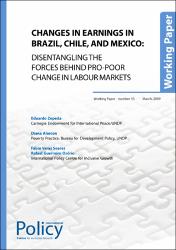Please use this identifier to cite or link to this item:
https://repositorio.ipea.gov.br/handle/11058/15199Full metadata record
| DC Field | Value | Language |
|---|---|---|
| dc.contributor.author | Zepeda, Eduardo | |
| dc.contributor.author | Alarcón, Diana | |
| dc.contributor.author | Soares, Fabio Veras | |
| dc.contributor.author | Osorio, Rafael Guerreiro | |
| dc.date.accessioned | 2024-10-03T23:52:26Z | - |
| dc.date.available | 2024-10-03T23:52:26Z | - |
| dc.date.issued | 2009 | |
| dc.identifier.uri | https://repositorio.ipea.gov.br/handle/11058/15199 | - |
| dc.description.abstract | Despite the recovery of economic growth in Latin America during the 1990s, rising unemployment, high informality rates and sluggish wages lie at the root of high inequality and poverty. This paper looks at changes in hourly earnings from the early 1990s to the early 2000s in three relatively stable countries: Brazil, Chile and Mexico. Using econometric techniques, the paper decomposes the change in earnings per worker into changes in the demographic and socio-occupational characteristics of workers, changes in the returns to such characteristics, and changes in unobservable factors. The paper attempts to address the link between labour markets and the dynamics of inequality and poverty by comparing the average performance of the entire working labour force with the performance of the 20 per cent of workers with the lowest earnings. The paper finds that earnings per worker are the result of slow-moving changes in the structure of employment and the characteristics of workers, as well as rapid changes in the prices of labour for specific workers. Demographic changes, better education and the decline of agricultural labour are among the most significant changes in the structure of employment, and they contribute to observed changes in earnings. Among the most important changes in prices contributing to the change in earnings are changes in the returns to formal and informal employees relative to the self-employed; changes to full-time employment relative to part-time workers; changes in the returns to urban workers relative to rural workers; and change in the earnings of workers in services relative to workers in agriculture. In general, changes in earnings frequently favoured low-earning workers, mostly because of the change in the returns for their labour. This is in contrast to the changes in the structure of employment, which tended to favour high-earning workers. | en |
| dc.language.iso | en | |
| dc.title | Changes in Earnings in Brazil, Chile, and Mexico: Disentangling the Forces Behind Pro-Poor Change in Labour Markets | en |
| dc.type | Working Paper | |
| dc.rights.holder | International Policy Centre for Inclusive Growth | |
| dc.rights.holder | United Nations Development Programme | |
| dc.location.country | Brasil | |
| dc.description.physical | 32 p. : il. | |
| dc.rights.type | Licença total exclusiva | |
| dc.rights.license | O texto e dados desta publicação podem ser reproduzidos desde que as fontes sejam citadas. Reproduções com fins comerciais são proibidas. | |
| dc.subject.keyword | Changes in Earnings | |
| dc.subject.keyword | Brazil | |
| dc.subject.keyword | Chile | |
| dc.subject.keyword | Mexico | |
| dc.subject.keyword | Pro-poor | |
| dc.subject.keyword | Labour Markets | |
| ipea.access.type | Acesso Aberto | |
| ipea.researchfields | N/A | |
| ipea.classification | Economia. Desenvolvimento Econômico | |
| ipea.classification | Emprego. Trabalho | |
| Appears in Collections: | Publicações do IPC-IG | |
Files in This Item:
| File | Description | Size | Format | |
|---|---|---|---|---|
| en_IPCWorkingPaper51.pdf | 271.61 kB | Adobe PDF |  View/Open |
Items in DSpace are protected by copyright, with all rights reserved, unless otherwise indicated.

